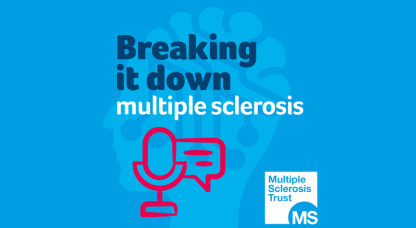Sleep problems are more common in people with MS than the general population. Around half of people with MS say they experience disturbed sleep. This is about four times higher than the general population. Despite this, sleep disorders remain underdiagnosed and undertreated in MS.
Both poor quality sleep and not enough sleep can impact on daily life. It can:
- lead to daytime sleepiness and low energy levels
- affect memory and make it difficult to concentrate
- worsen depression make other symptoms of MS such as pain and fatigue much worse.
The following are the most common sleep problems seen in MS.
- Insomnia – difficulty getting to sleep or staying asleep for long enough. It may be that you wake up during the night and struggle to go back to sleep or wake up early.
- Sleep-related breathing disorders – this includes chronic snoring and obstructive sleep apnoea (OSA). OSA causes you to repeatedly stop and then restart breathing whilst you sleep.
- Periodic limb movement disorders. This includes movements such as sudden jerking or kicking out in your sleep. Another example is restless legs syndrome (RLS). RLS is an overwhelming urge to move your legs in bed.
There are many reasons why sleep can be disturbed. Some MS symptoms can make sleep difficult or interrupted. These include:
Other MS-related factors which can affect sleep are:
- as a side effect of some medications and disease modifying drugs used in MS
- a lack of exposure to daylight during the day if you struggle to go out
- being less active or sedentary which can alter sleep patterns
- lesions in the area of the brain that control sleep.
Issues that are also common in the general population are also seen in MS, such as:
- having a young family or other responsibilities which disrupt sleep
- concerns or worries that make it difficult to ‘switch off’ or make you restless.
It is important to treat sleep disorders in MS as this can lead to improvements in other MS symptoms. This is especially true for fatigue, memory and concentration problems, depression and pain. This in turn can lead to improved quality of life and a reduction in disability.
Many of the MS symptoms which can affect sleep are treatable. Speak to your MS team to discuss your options if you’re not receiving treatment for them. If any medications are affecting your sleep, discuss whether there are alternatives available. Or ask whether changing the timing of treatment could help.
The beta interferon DMDs (Rebif, Avonex, Plegridy, Extavia and Betaferon) can affect sleep. Typically, the advice is to take them in the evening so you can sleep through the side-effects. But you may prefer to take them earlier in the day if the side-effects are manageable. That way your sleep may be less affected.
Some MS treatments have a positive effect on sleep. For example, some treatment options for pain, such as gabapentin, can improve night-time pain and so promote better sleep. Studies have shown that the DMD natalizumab (Tysabri) improves fatigue and sleep patterns. Cannabis-based medicines are also associated with improved sleep and reduced depression. This could be a direct effect of the cannabinoids taken. Or it may be because the treatment reduces spasticity and pain.
Non-drug approaches such as increasing exercise may be beneficial. This could be due to the increased levels of the good mood chemical serotonin seen with exercise.
Melatonin is a hormone that helps control sleep. Levels rise during the night and then return to normal during the day. Sometimes a synthetic version can be prescribed for sleep problems. There is early evidence it may help in MS. There are other areas of active research showing some initial promise.
- Chronotherapy – this aims to restore a normal sleep-wake pattern. It can include introducing good ‘sleep hygiene’ habits (see below), timed exposure to light and medication to reset your body clock.
- Cognitive behavioural therapy – could help you identify unhelpful thoughts and behaviours which are affecting your sleep.
- Non-invasive brain stimulation techniques – for example, using electric currents or magnetic fields.
You may, in discussion with a health professional, decide it is appropriate to take a prescribed sleeping medication such as zolpidem, zopiclone (Zimovane) or a benzodiazepine for a short time.
Coping with poor sleep, Diana writes:
Establishing regular habits or good ‘sleep hygiene’ can improve sleep quality.
- Stay as physically active as possible. But allow plenty of time to wind-down before bedtime.
- Avoid getting overtired. Being too tired can make it difficult to get to sleep.
- Try to get daily exposure to sunlight.
- Avoid stimulants (caffeine, chocolate, alcohol) and large meals before bedtime.
- Try to reduce stress before bedtime.
- Establish a bedtime routine. This could include a relaxation technique, a warm ‘milk-based’ drink such as Ovaltine, or a warm bath. Avoid screens and bright lights. Try to go to bed and get up at the same time every day. Keep to this routine throughout the week.
- Avoid activities such as watching TV in bed. Keep it as a place for sleep – and sex!
- Try to maintain a comfortable temperature in your bedroom. Being too hot or too cold can disturb sleep.
- Don’t try to force sleep. If you’re lying awake, it may be better to get up and do something relaxing, perhaps something from your routine. Then return to bed when you’re feeling sleepier.



